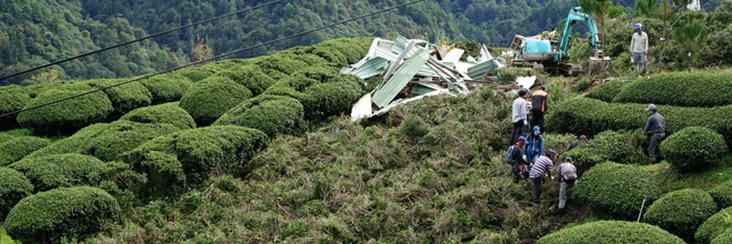
The Basic Facts Behind The Reclamation Of Dayuling Tea Farms
Eco-Cha has been asked to comment on the discussions trending on tea platforms in response to a recent article published by Munchies on Vice. This Taiwan High Mountain Tea related story has brought international attention to an ongoing issue that has been developing for many years and is known publicly here in Taiwan. This article focused on the removal of tea plots in Taiwan's highest elevation farming region of Dayuling in Hualien County. In order to give the most accurate account we can, we've spent the last few days asking our friends who are leading representatives in the industry about this issue. We purposely sought out various perspectives from farmers and industry professionals that we know personally and trust.

This story is embedded in the history of Taiwan's development since the inception the KMT regime that replaced the Japanese occupation after WW II. The current government has been developed just in the last 60 years or so. This topic is one aspect of many programs that were implemented by the new government involving land reclamation and distribution. The story of Dayuling involves land designated as National Forest Land.
To our knowledge, there are many variations of the regional-specific regulations that apply to areas classified as National Forest Land. These variations depend on elevation, location, if the land was previously inhabited, and so on. The definitions of land use and regulations have changed over the last several decades as well. The regulations relevant to this story apply to remote high elevation National Forest Land in Central Taiwan, of which Dayuling is at the top. In recent decades, designated sections of this land can be rented from the government for tree growing and harvesting only, but not for agricultural use.

This newly developing governance that began over 50 years ago was based on the primary goal of economic development combined with an unestablished infrastructure of regulatory control. It also involved KMT soldiers being relieved of their military duty in the 1950's and offered land as their pension. We don't know the details of this early history well enough to relate it comprehensively. It is known however, that the current regulations have been in effect and clearly stated to the public for decades. So anyone currently renting this forest land has signed contracts that have clearly stated the stipulations for at least the last 20 years.
From what we've gathered, the government has gradually begun enforcing these regulations since the level of economic and real estate development has demanded attention to such issues as environmental protection of watershed land in mountainous regions. After many years of notification to the tea and vegetable farmers in Dayuling and other remote wilderness regions such as Yushan National Park, the government finally has taken action in the last five years or so. Since the farmers did not comply with the demand to eradicate their violations of forest land use, the government implemented the removal of farm crops and any buildings that were constructed on forest land.

The farm that was highlighted in the recent story by Munchies was not spared because it was evidently subject to the same stipulations as other nearby farms that have already been removed in recent years. The government claimed that there was no way to preserve it without demonstrating a bias that discriminated against the farms already affected. This basically was bound to happen sooner or later, and it turned out to be later — after the local private sector made a massive profit from producing High Mountain Tea at a price that far exceeded anywhere else in Taiwan. Simply put, they capitalized on being the highest elevation tea farms in Taiwan. Tea from this area sold for anywhere from double to ten times the amount of other sources that classify as High Mountain Tea — just because it boasted the status of tea grown at the highest elevation.
In addition to the fact that it was against regulations, it is an ironic outcome of the marketing strategy that popularized this new tea type simply referred to as "Gao Shan Cha" or High Mountain Tea. The value of High Mountain Tea has been promoted for the last 30 years as being "the higher the elevation, the better" in terms of quality. This of course is not necessarily true. Quality tea production depends on knowledgeable and responsible farm management combined with skill and care in processing the harvested leaves. Elevation is definitely a significant, but hardly the decisive factor in determining the quality of tea produced.
In our perception, it is a complicated and unfortunate event in the development and subsequent governance of High Mountain Tea production in Taiwan. The tea farmers and their resources are being significantly impacted as a result of commercial development in areas that probably should have been protected from early on. Yet this is not an anomaly in our modern age where populations and subsequent developments of land have rapidly advanced without proper implementation of sustainable planning.


